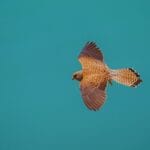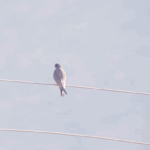Unlike the other Balkan countries, where the deliberate poisoning phenomenon is well-incorporated and clearly defined as a prohibited action in the legislation over the years, the intentional wildlife poisoning in Albania has not been regarded as a prohibited activity in the national legal framework till July 2019. As a consequence, the fact that wildlife poisoning wasn’t predicted as an illegal action – made the Anti-poisoning efforts in Albania, even more complex, due to lack of national institutional capacities for detection, official data of poisoned cases, etc.
Following the efforts to stop wild-life poisoning in Albania, the Albanian Ornithological Society (AOS) has and continues to be actively engaged in tackling wild-life poisoning and investigating the deliberate poisoning phenomenon all over Albania and more particularly in the territories of the Egyptian Vulture, the last remaining vulture still breeding in Albania.
In this course of actions, in synergy with “Balkan Anti-Poisoning Project” supported by VCF and MAVA Foundation, “Illegal Killing and Taking of Birds” supported by EuroNatur and MAVA Foundation and the “Egyptian Vulture New Life” supported by BSPB and EU, AOS lobbied in 2019 for the amendment of the Law No. 10 006, dated 23.10.2008 “On the Protection of Fauna”. The integrated amendments proposed by AOS to the Law on the protection of fauna aimed for:
a.explicitly stating that poisoning and particularly the use of poison baits is by law a prohibited action,
b.explicitly stating that the use of agricultural chemicals, veterinary drugs and services is a potential threat to wild fauna-in case they are used contrary to the current legislation covering agricultural chemicals, veterinary drugs and services.
Finally, in July 2019, the Albanian Parliament adopted the amendments brought in the law of fauna bringing thus joy to the national and international NGOs involved in anti-poisoning efforts. Furthermore, these amendments reach further importance when considering the recent amendments of the penal code.
Article 202 “Harming of protected species of flora and fauna” of the Penal Code, provides now that “Killing, destruction, possession, acquisition or trade of specimens of protected species of wild flora and fauna or their parts or by-products, in breach of the requirements of specific national legislation or relevant permit, unless such a case has occurred over a negligible amount of these specimens from the biological point of view of the group belonging to the protected species, and has no significant impact on the conservation status of the species, constitutes criminal contravention and is punishable by a fine or imprisonment of two to seven years.”.
Due to the above legal amendments, intentional poisoning is not only an administrative offence but also a breach punished by prison or penal fine.
The amendment of the national legal framework with regards to anti-poisoning serves as a pre-requisite for further conservation work related to combating wildlife poisoning. Following this, AOS and the Ministry of Tourism and Environment are currently working with national and international partners for developing an Anti-Poisoning Road Map which will orientate anti-poisoning policies in Albania. The adaptation of the legal national framework and the enhancement of the strategical framework is for sure a stepping stone but more measures need to be taken on stopping wildlife poisoning in Albania and particularly in prevention, detection, prosecution and public awareness.





